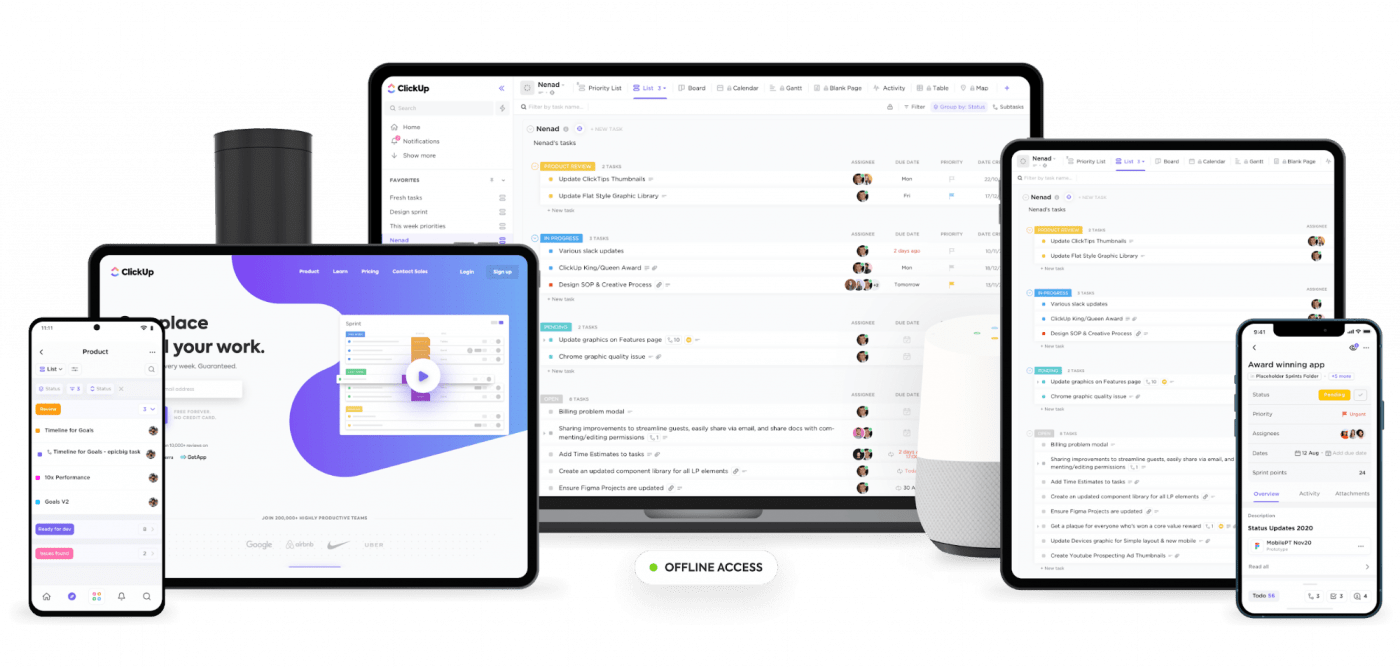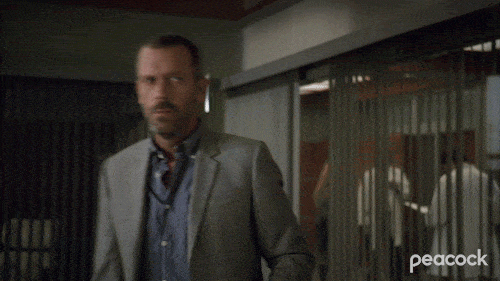يوجد طابور من المرضى في غرفة الانتظار.
الطبيب متأخر اليوم.
يقول موظفو الصيدلية إنهم بحاجة إلى إعادة تعبئة بعض العبوات لأن الأدوية قد نفدت.
بالنسبة لصناعة مسؤولة عن الاعتناء بحياة الناس، يمكن أن تكون صناعة الرعاية الصحية قاسية جداً على القائمين عليها.
فكيف يحافظون على تركيزهم مع كل ما يحدث؟
مهارات ممتازة في إدارة مشاريع الرعاية الصحية.
مثل د. ليزا كادي ، رئيسة إدارة المستشفى في المسلسل التلفزيوني هاوس م.د.
بالتأكيد لن يرغب أحد في مستشفى برينستون بلينزبورو في ترك إدارة المشروع في أيدي أشخاص مثل الدكتور جريجوري هاوس
ففي النهاية، الرعاية الصحية قطاع عالي المخاطر.
حياة الناس هنا على المحك حرفياً.
لا يمكنك تحمل أي أخطاء. على الإطلاق.
إذن ماذا يمكنك أن تفعل؟
قم بتعيين مدير مشروع للحفاظ على تنظيم الأمور الحيوية والنشاط
ولكن إذا كنت تعاني من أعراض سوء إدارة المشاريع وتريد تحقيق أهداف مشروعك لا تقلق
نحن ندعمك *حرفياً **
في هذا المقال، سنغطي ما هي إدارة مشاريع الرعاية الصحية وسبب أهميتها، و ما يتطلبه الأمر لتكون مدير مشروع جيد في مجال الرعاية الصحية.
مكافأة: سوف تتعلم أيضًا كيفية تمريض مشاريعك لتعود إلى الصحة مع أداة إدارة مشاريع الرعاية الصحية .
_كل المجموعة؟
_ دعنا نعطيك جرعة من إدارة مشاريع الرعاية الصحية
ما هي إدارة مشاريع الرعاية الصحية؟
لمواكبة القبضة المتشددة لشركات التأمين الصحي، والحجم الهائل لنظام الرعاية الصحية، والمسألة الكبيرة المتعلقة بالسلامة، تتطلب مؤسسات الرعاية الصحية الحديثة الكثير من التخطيط لإنشاء عملية فعالة.
وهنا يأتي دور إدارة مشاريع الرعاية الصحية.
إنها تخطيط وتنفيذ وصيانة أي مشروع للرعاية الصحية لتحسين أداء المنظمة.
فهو يساعد على تبسيط المشروع الذي يمكن أن يساعد في توفير المال وفي نفس الوقت تحسين رعاية المرضى التي تعود بالنفع على مؤسسة الرعاية الصحية في نهاية المطاف.
على سبيل المثال، لنفترض أن الدكتورة كادي ضاقت ذرعًا بالدكتور هاوس وتريد افتتاح قسم جديد للتشخيص في مؤسستها.
سيتعين عليها أولاً إنشاء خط أنابيب ملموس لفتح وإدارة مرفق الرعاية الصحية الجديد هذا. ويمكنها إما أن تقوم بالتخطيط بنفسها أو تعيين مدير مشروع.
وهو أمر تتقنه

لكن هل نحتاج حقًا إدارة المشاريع في مجال الرعاية الصحية_؟
لنكتشف ذلك.
لماذا تحتاج إلى إدارة مشاريع الرعاية الصحية؟
تتطور صناعة الرعاية الصحية باستمرار.
تظهر دائمًا تقنيات جديدة، وتحتاج مؤسسات الرعاية الصحية إلى مواكبة ذلك.
ونتيجة لذلك، هناك ضغط هائل على قطاع الرعاية الصحية لمواكبة العصر وتقديم رعاية صحية عالية الجودة للمرضى.
تحتاج شركات الرعاية الصحية أيضًا إلى الامتثال لمختلف اللوائح الحكومية مثل HIPAA (قانون نقل التأمين الصحي والمساءلة) واللائحة العامة لحماية البيانات (GDPR) للفوترة وأي عملية أخرى _
وهنا يأتي دور الرعاية الصحية لإدارة المشاريع.
مع التأسيس مبادئ إدارة المشاريع ، يمكن لرؤساء المنظمات مثل الدكتور كادي أن يجلبوا الهيكلية والانضباط إلى المنظمة.
يمكن أن تساعد إدارة المشاريع الفعالة أيضًا في:
- رعاية وتجربة أفضل للمرضى
- تحسين الميزانية
- إدارة أفضل
- تواصل أكثر سلاسة
- علاقات أفضل مع أصحاب المصلحة
والآن، كيف تقوم فعلياً بإدارة المشاريع في مجال الرعاية الصحية؟
3 منهجيات شائعة لإدارة مشاريع الرعاية الصحية
بصرف النظر عن العلوم الطبية، يحتاج أخصائيو الرعاية الصحية أيضًا إلى تعلم علم إدارة المشاريع.
دعونا نلقي نظرة على منهجيات إدارة المشاريع التي يمكنك استخدامها في قطاع الرعاية الصحية:
1. إدارة المشاريع الرشيقة إدارة المشاريع الرشيقة هي بمثابة الترياق المضاد لمواجهة مشاكل إدارة المشاريع التقليدية.
فهي تتبع نهجًا تكراريًا وتقسم المشروع إلى دورات تطوير أصغر (2-4 أسابيع) تسمى سباقات السرعة. يمكن للمدير تحديد تراكم سريع التي تحدد ما يحتاج الفريق إلى التركيز عليه خلال تلك الدورة.
هذا يسهل التكيف مع التغييرات بشكل أسهل، خاصة في صناعة مثل الرعاية الصحية التي لديها متغيرات متغيرة باستمرار. تتمتع أجايل أيضًا بالعديد من المزايا الرئيسية وتصلح لمعظم الصناعات لأنها تضمن المرونة والقدرة على التكيف والعمل الجماعي وعائد استثمار أسرع.
وعندما يتعلق الأمر ببيئة الرعاية الصحية، يمكن أن تساعدك أداة إدارة المشاريع الرشيقة على إكمال مشروع الرعاية الصحية بسرعة لمواكبة الأمور.
هل تبحث عن_ أداةرشيقة_ لإدارة المشاريع أداة للرعاية الصحية؟
تحقق من هذه أفضل 12 أداة رشيقة لإدارة المشاريع .
على سبيل المثال، لنفترض أن الدكتورة كادي تريد طرح تطبيق جديد لحجز المواعيد في المستشفى الذي تعمل فيه.
يمكنها استخدام المنهجية الرشيقة وطرح تطبيق تجريبي أولاً. وبهذه الطريقة، يمكنها الحصول على تعليقات من المرضى حول واجهة المستخدم وسهولة حجز المواعيد لدمج التغييرات بسرعة في تصميم تطبيقها.
وبهذه الطريقة، لن تضطر إلى إضاعة الوقت والموارد لإنشاء تطبيق جديد من الصفر إذا لم يكن التطبيق الأول سهل الاستخدام لمرضاها.
المكافأة: اطلع على أفضل 10 أنظمة برمجيات لإدارة المرضى
2. الشلال
الشلال هو عملية تقليدية قديمة في إدارة المشاريع.
وهي تتبع نهجًا خطيًا حيث تقوم بتقسيم كل خطة المشروع إلى مراحل، وكل مرحلة تتسلسل إلى المرحلة التي تليها، مثل الشلال الحقيقي.

عادةً ما تتضمن عملية إدارة المشروع خمس مراحل: المتطلبات والتصميم والتنفيذ والاختبار والتسليم. كيف يختلف الشلال عن أجايل؟ في طريقة الشلال، يحتاج الفريق إلى إكمال مرحلة أولاً ليتمكن من الانتقال إلى المرحلة التالية.
في حين أنها واحدة من أكثر أساليب إدارة المشاريع شيوعًا المستخدمة في الصناعات الكبيرة مثل البناء ، فإن لها عيوبها.
يمكن أن يؤخر النتائج ويمكن أن يصبح المشروع زائداً عن الحاجة. يمكن أن يكون هذا ضارًا لمؤسسة رعاية صحية تحاول تقديم رعاية فورية للمرضى.
ومع ذلك، يمكن أن يعمل نهج الشلال بشكل جيد إذا أرادت الدكتورة كادي افتتاح مرفق رعاية صحية جديد. يمكنها معالجة المشروع على مراحل.
أولاً، تحتاج إلى تحديد التبعيات ومتطلبات افتتاح القسم، مثل الميزانية والموظفين والتصريح الحكومي وما إلى ذلك. بمجرد أن يكون لديها مخطط للمتطلبات، عندها فقط يمكنها الانتقال إلى مرحلة التنفيذ.
لست متأكدًا كيف يمكن أن يساعدك نهج الشلال؟
دليلنا المفصل عن إدارة مشاريع الشلال يستطيع أن يوضح لك كيف
3. هجين
نظرًا لأن الرعاية الصحية قطاع سريع التغيير، فإن اعتماد نهج الإدارة الهجينة يمكن أن يكون هو ما طلبه الطبيب
يمكنك تنفيذ المشاريع بسرعة من خلال منهجية رشيقة مع وجود خارطة طريق لمجلس الإدارة والمستثمرين من خلال نهج إدارة المشاريع الانحدارية.
وبهذه الطريقة، يمكنك الحفاظ على مشاركة المستخدمين النهائيين خلال المراحل المختلفة، وضمان تحقيق النتائج الصحيحة للمشروع، وإبقاء أصحاب المصلحة سعداء.

ولكن معرفة ما يجب القيام به لا يكفي.
يجب أن تعرف أيضاً كيفية القيام بذلك.
هل أنت مستعد لمعرفة ما يتطلبه الأمر لتكون مدير مشروع رعاية صحية؟ _هيا بنا
ما الذي يتطلبه الأمر لتكون مدير مشروع رعاية صحية جيد؟
مديرو مشاريع الرعاية الصحية هم العمود الفقري للمشروع. _*لا أقصد التلاعب بالألفاظ
فهم يقودون ويشرفون على مشروع الرعاية الصحية من القبول إلى الخروج.
A مدير البرنامج يضمن تسليم المشروع في الوقت المحدد ويبقى في حدود الميزانية.
كما يمكنهم أيضًا تحديد ما إذا كان المشروع في حالة تعثر المشروع بسرعة وتقديم الحلول المعقولة. 🤒
تحتاج مؤسسات الرعاية الصحية بالتأكيد إلى متخصص في إدارة المشاريع لجعل المشاريع متوافقة مع القوانين.
ومع ذلك، فإن إدارة المشاريع ليست لأصحاب القلوب الضعيفة.
تتطلب مهنة الرعاية الصحية مهارات إدارية محددة. A شهادة إدارة المشاريع مثالية أيضًا.
إليك ما يتطلبه الأمر لتكون مدير مشروع ناجحاً.
المكافأة: الـ
/href/ مدونة؟ ص=37151_37 أفضل أدوات إدارة البرامج *%/href/_
1. مهارات مدير المشروع
إذا كنت تريد أن تكون مديراً جيداً، يجب أن تكون صحيحاً مهارات إدارة المشاريع لإدارة الفريق والمشروع ومواجهة تحديات صناعة الرعاية الصحية.
إليك بعض المهارات الأساسية التي يجب أن يتمتع بها مدير مشروع الرعاية الصحية:
- المرونة: يجب أن تكون سريع الاستجابة وتعديل المشروع لإبقاء الأمور على المسار الصحيح
- التواصل: إن صناعة الرعاية الصحية تتمحور حول الأشخاص. يجب أن تكون مستمعاً نشطاً ومفاوضاً فعالاً لتأمين الصفقات
- القيادة: يجب أن تكون قادراً على تحفيز الآخرين وإلهامهم. يجب أن يثق بك فريقك وأن يكون لديك الثقة في المشروع
- حل النزاعات:الرعاية الصحية سوق غير اعتيادي ينطوي على مخاطر متأصلة. كمهارة في إدارة المشاريع، يجب أن تكون قادرًا على التصرف بسرعة وتخفيف المواقف عالية التوتر
- التفويض: يجب أن تكون قادرًا على _توزيع المهام على أعضاء الفريق المختلفين. سيساعدك هذا على استخدامالموارد المخصصة بكفاءة والحفاظ على المشروع في حدود الميزانية
2. شهادات إدارة مشاريع الرعاية الصحية
_قد يكون الدكتور هاوس خبيرًا في التشخيص، ولكن هل يفهم علم الإدارة؟ ربما لا
يبحث العديد من أخصائيي الرعاية الصحية عن تدريب رسمي في إدارة المشاريع لإدارة المشاريع المعقدة والأشخاص بشكل أفضل.
_على الأقل يجب على رؤساء الأقسام مثل الدكتور هاوس
 img/
img/
3. الامتثال لقانون HIPAA
تعتمد المستشفيات والعاملين في مجال الرعاية الصحية على معلوماتية الرعاية الصحية للوصول إلى البيانات الحساسة طوال الوقت. إذا تم تسريب هذه المعلومات، فقد يشكل ذلك تهديدًا خطيرًا لخصوصية المريض.
قانون قابلية التأمين الصحي والمساءلة (HIPAA) هو القانون الحاكم لضمان حماية بيانات المرضى الحساسة.
إذا كنت تستخدم أي برنامج إدارة المشاريع التي تصل إلى بيانات المريض، يجب حمايتها:
- الهجمات الخبيثة على معلومات المرضى
- الوصول إلى معلومات المريض ومشاركتها
بصفتك مديرًا، تقع على عاتقك مسؤولية الإشراف على امتثال كل برنامج أو عملية تقنية أو غير تقنية لمعايير قانون HIPAA للحفاظ على أمان معلومات الرعاية الصحية.
والآن بعد أن انتهينا من الأساسيات، دعنا نلقي نظرة على بعض النصائح المتعلقة بإدارة الرعاية الصحية. 💁
## 9 نصائح مفيدة لإدارة المشاريع في قطاع الرعاية الصحية
إذا كنت ترغب في شغل منصب مدير مشروع رعاية صحية، فيمكنك أيضًا أن تتسلح ببعض النصائح المفيدة في مجال الإدارة.
أولاً، نتوجه أولاً إلى ألبرت هو، مدير مشروع نظام ويليام أوسلر الصحي ومؤسس أبطال الرعاية الصحية للحصول على بعض نصائح الخبراء:
- تقسيم النواتج إلى أقسام أصغر وأكثر قابلية للإدارة. الإطار الزمني المثالي هو أن تكون النواتج قابلة للإنجاز في 3 إلى 12 شهرًا.
- إذا كان المشروع متعدد السنوات وله نطاق عمل كبير، فيجب أن يكون لكل مرحلة من مراحل المشروعميثاق المشروع لتحديد العمل الذي سيتم إنجازه.
ذكر هو أنه من السهل على %Ho رعاة المشروع لفقدان الاهتمام بمشروع متعدد السنوات، لذا فإن تقسيم المنجزات سيساعد في الحفاظ على الزخم
تشمل النصائح المهمة الأخرى لإدارة مشاريع الرعاية الصحية ما يلي:
- تشخيص المتطلبات وأهداف المشروع من خلال طرح الأسئلة الصحيحة على القيادة
- إذا كان لديك مشاريع متعددة، فحدد أولويات المشاريع التي تساعد على تبسيط العملية
- تأكد من التواصل المفتوح ليكون فريق مشروعك على نفس الصفحة
- بناء فريق متنوع. استعن بموظفين من مختلف الأقسام لمساعدتك في تحسين العملية
- كن مستعدًا للطوارئ. إذا طرأ شيء ما فأجرِ بعض الاختبارات، _وتكيف مع الوضع، واستمر في المضي قدمًا
- اتبع ميثاق المشروع الذي يحدد أهدافك الاستراتيجية ومواردك وجدولك الزمني ومقاييسك الرئيسية
- كن متزامنًا مع لوائح الرعاية الصحية والحوكمة التي يمكن أن تؤثر على برنامجك أو مشروعك
أصبح لديك الآن بعض النصائح التي لا تفشل في تطبيقها.
_ما التالي؟
تعلم أفضل طريقة لإدارة مشاريع الرعاية الصحية الخاصة بك!
الطريقة المثلى لإدارة مشاريع الرعاية الصحية في عام 2024
إذا أراد الدكتور هاوس أن يحافظ على سيطرته على التشخيص ويصبح مديراً ذكياً، فعليه أن يكون على دراية بمصطلحات مثل التخطيط السريع , أجايل وسكرم , سير العمل الآلي والمزيد.
سيحتاج إلى تعلم كيفية استخدام مخطط جانت و لوحات كانبان لتصور المشاريع وتحسينه تجربة إدارة المشاريع .
والأهم من ذلك أنه سيتعين عليه تعلم استخدام برنامج إدارة مشاريع الرعاية الصحية لتنفيذ جميع مصطلحات الصناعة التي ذكرناها للتو.

مثل انقر فوق !
_انتظر، ما هذا؟

النقر فوق هو عالي التصنيف برنامج إدارة المشاريع الذي يستخدمه مديرو مشاريع الرعاية الصحية وغيرهم من مديري مشاريع الرعاية الصحية الفرق المنتجة في جميع أنحاء العالم .
يمكن لأداة رشيقة مثل ClickUp أن تمكّنك أنت وفريق مشروعك من تقديم نتائج أسرع بكفاءة.
استخدمها لإدارة مؤسستك، من الأطباء إلى قسم تكنولوجيا المعلومات للممرضات وعمال النظافة استخدم أكثر من 1000 تكامل لتصور مشروعك بالطريقة التي تريدها.
ومع ذلك، فإن ما يجعل ClickUp مناسبًا حقًا لقسم الرعاية الصحية الخاص بك هو أنه متوافق مع قانون نقل التأمين الصحي والمساءلة (قانون قابلية التأمين الصحي والمساءلة).
ClickUp يتوافق مع إطار عمل درع الخصوصية واللائحة العامة لحماية البيانات (GDPR) (اللائحة العامة لحماية البيانات).
وهذا يعني أننا نضمن أعلى معايير الأمان لجميع عملائنا.
وعلاوةً على ذلك، فإن ClickUp لديه مجموعة متنوعة من ميزات إدارة المشاريع مجانًا !
إليك كيفية استخدام ClickUp لإنجاح مشروع الرعاية الصحية الخاص بك:
- لوحات المعلومات :: إنشاء مركز تحكم لمشروع الرعاية الصحية الخاص بك ومشاركته رقميًا مع فريق الرعاية الصحية الخاص بك
- عرض عبء العمل : احصل على تصور يومي للمهام الموكلة لكل عضو من أعضاء الفريق. راقب عبء مهام فريقك وأعد تخصيص الموارد وفقًا لذلك
- عرض النموذج : إنشاء نماذج المرضى القابلة للتخصيص باستخدام الحقول المدعومة بالسحب والإفلات. استخدمها لطلب دعم تكنولوجيا المعلومات في المستشفى أو ملاحظات المرضى واختر المكان الذي تريد إرسال ردود النموذج إليه. استخدم أيضًاالحقول المخفية لمعلومات المريض التي لديك بالفعل
- عرض الجدول الزمني : تصور مشروعك بطريقة خطية مع مرور الوقت. قم بتجميع الجداول الزمنية لتخطيط العمل في المستقبل. أيضًا، قم بإنشاء خارطة طريق عامة للحفاظ علىأصحاب المصلحة في المشروع محدثة
- قوائم تدقيق المهام :: إنشاء قوائم المهام باستخدامالمهام الفرعية وتعيينها لزملائك في الفريق. تخصيصتعيينات متعددة للمهام المشتركة
- المستندات :: إنشاء ومشاركة مستندات المشروع وإجراءات التشغيل الموحدة للأطباء والممرضات. قم بتدوين المؤشرات الحيوية اليومية للمرضى وتفاصيل أخرى في صفحات متداخلة. يمكنك أيضًاذكر أعضاء الفريق من طاقم التمريض المناوب وتعيين المرضى إلى الأخصائيين الطبيين مباشرة منالأطباء:: تحديد وإضافة خيارات حقول المهام المختلفة لتتبع معلومات المريض بسرعة.
- قوائم التحقق المتكررة :: أتمتة المهام مثل إجراءات التنظيف الروتينية عن طريق إنشاء قوائم مراجعة للحراسة
- القوالب : قم بإدارة إدارة المستشفى الخاص بك باستخدام قوالب محددة مسبقًا. إنشاء وإعادة استخدامقوالب قائمة المراجعة لتحديث السجلات الصحية وتخزين النماذج وإدارة المرضى دون إضاعة الوقت
_وإذا لم تكن هذه الميزات كافية لإقناعك باستخدام ClickUp، تحقق من لماذا هو البرنامج رقم 1 لإدارة مشاريع الرعاية الصحية لفريقك.
هل تريد أن تحافظ على مشروعك لائقًا ككمان؟
المنظمة الصحية لا تنام أبدًا، ولا ينبغي أن تنام منظمة الرعاية الصحية الخاصة بك عمليات الإدارة .
والطريقة الوحيدة لإبقاء الأمور مستيقظة وتعمل (دون عناء) هي باستخدام برنامج لإدارة المشاريع مثل ClickUp!
هذه الأداة ستحافظ على قلب مشروع الرعاية الصحية الخاص بك ينبض.❤️
بدءًا من الوصول إلى مركز التحكم في المستشفى الخاص بك حتى عندما تكون نصف نائم (بفضل ساعات العمل الطويلة في المستشفى إلى تتبع عبء العمل في الوقت الفعلي، يمكن أن يكون ClickUp _مُنقذًا للحياة
إنشاء نماذج قابلة للتخصيص لملء تفاصيل تأمين المريض، وتوفير رعاية أسرع مع الأتمتة وإنشاء عمليات متسقة مع القوالب .
ClickUp هو بالفعل حل سحري لجميع أمراض إدارة المشاريع.
ما الذي يعيقك؟ احصل على جرعة مجانية من ClickUp للحفاظ على مشروع الرعاية الصحية الخاص بك في مأمن من المخاطر لمساعدة مرضاك بشكل أفضل!


